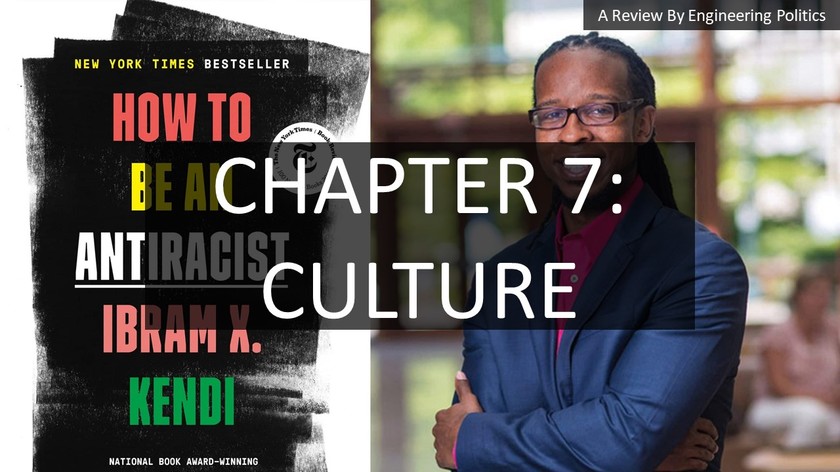
Hold on to your butts! It’s time to talk about culture, or what Kendi calls, “you being racist and me saving you with my magic antiracist policy.” In this chapter, Kendi talks about culture. Like most critical race theorists, culture is used as an acceptable series of behaviors by them, and a racist dog whistle for everyone else. It is directly tied to race when convenient for their argument. The theme is no different here. Kendi starts the chapter by defining Cultural Racist and Cultural Antiracist.
“CULTURAL RACIST: One who is creating a cultural standard and imposing a cultural hierarchy among racial groups.
CULTURAL ANTIRACIST: One who is rejecting cultural standards and equalizing cultural differences among racial groups.”
Culture is an interesting thing. It’s like the economy: we can’t see it, but we know it’s there. This makes it hard to describe cultural phenomenon and makes it very easy to spin these phenomena into assumptions of racial superiority or racial inferiority. That is what your traditional racist does. That is what Kendi does. His use of the term standards as some pejorative is silly at best. We all have standards, hopefully. It is standard and polite to wave back at a person who waved at you. This is a cultural standard. It isn’t evil or racist or dictated by public policy. Is there a hierarchy of standards? Not really, or at least not a mass hierarchy of standards. To use the waving example, when someone waves at you, you can either wave back, not wave at all, or give them the finger. In this hierarchy of expected responses to someone waving at you, waving back would be at the top, not waving at all would be around the middle, and giving the finger would be at the bottom. The standard response would be waving back, or the action near the top of the hierarchy of expected response. Cultural hierarchies often work this way. There is a context to the hierarchy that makes it important to hold standards. Waving back at someone waving at you shouldn’t be considered a white standard.
An interesting point I think it’s important to highlight is the origins of Ebonics, or African American Vernacular English (AAVE). Kendi talks about this at the beginning of the chapter. He says black Americans use it as a badge of pride, but he doesn’t get into the origins of the alternative language. There is some dispute about the origins of Ebonics. Some claim it is derived from West African language, since West Africans were taken to the South, but there isn’t a lot of commonality between the languages. The best and most coherent origin theory I heard comes for Thomas Sowell, in a book I can’t recall right now (he’s written so many good ones), about the broken English used by the Northern Brits who settled in the South. Northern Brits were considered the less educated and more backwards culture in Brittan during that time, which explains why slavery became so popular so quickly in the South. They too spoke broken English similar to what Ebonics sounds like today. Slaves learned this dialect as their first introduction to the English language. This would mean Ebonics is derived from slavery, but this isn’t a popular origin theory because of the reluctance to drop the use of Ebonics in many communities. I only make this point because of how easy it is to reject the origins of something that came from a bad place just because your culture holds that standard. Just sayin’.
“To be antiracist is to reject cultural standards and level cultural difference. Segregationists say racial groups cannot reach their superior cultural standard. Assimilationists say racial groups can, with effort and intention, reach their superior cultural standards.”
Superior is seen as a dirty word. This is why the quote above feels like it makes sense. But if we exchange the word superior for a synonym like exceptional, the narrative changes without the meaning changing at all. As I said earlier, there are many cultural standards and they don’t rely on race. These standard help us communicate and become a more cohesive nation. This is the melting pot theory. This isn’t a rejection of diversity, even though Kendi would beg to differ.
Later in the chapter Kendi quotes a few cultural racists who hold ideas that seem to be non-racist but are actually racist to the trained eye. Kendi uses the term civilization as an example of a racist dog whistle. He says, “civilization is often a polite euphemism for cultural racism.” To hold a standard of civility is racist, you see. I believe Kendi’s fear is a standard used as an attack on diversity. Diversity is our strength, right? I’ve attended many leadership seminars in the corporate world and most of them have the same message: diversity is a good thing if everyone can effectively communicate and they all have the same goal. Groups who are diverse don’t actually perform better than homogeneous groups in most cases. Groups who are diverse but share a main goal and communication system perform better than homogenous groups because you get more diverse input within the standards that apply to that goal. We can be a diverse nation, but if we aren’t able to communicate or strive for the same goal, then we will fail.
“To be antiracist is to see all cultures in all their differences as on the same level, as equals. When we see cultural difference, we are seeing cultural difference – nothing more, nothing less.”
I don’t necessarily disagree with the message above, although I wouldn’t use the word antiracist. Cultures have differences and we should treat them equally, but that doesn’t mean they will have equal outcomes. If my neighbor waves to me and I don’t wave back, I don’t expect to be invited over for dinner any time soon. Kendi also seems to be explicitly tying culture to race even though the last sentence in the statement above says otherwise. If culture is just culture, then the use of the terms cultural racism and cultural antiracism would not be needed. I agree, but Kendi clearly doesn’t. This chapter doesn’t talk about cultural appropriation, or the adoption of cultural elements your subscribed culture doesn’t own, but going on the assumption culture is just culture and not directly tied to race, cultural appropriate shouldn’t be a problem. I wonder what Kendi would think about that considering all critical race theorists have a strong opinion on this topic. I write these reviews as I read the chapters, so maybe Kendi addresses this in a later chapter, even though the chapter on culture seems to be the most appropriate place to discuss it. We will see.
Thanks for reading my rant style review of the seventh chapter of How to be an Antiracist by Ibram X. Kendi. Please let me know if you find this useful. My goal here is to explain each chapter enough and in a somewhat objective way so others don’t waste their time and money on investigating this material themselves. I know this kind of goes against the logic of investigation where you want to read the source material yourself and build your own conclusions, but this is a very shallow read that does not strain the mind, in any positive way at least, like any proper academic book should. Please leave a comment with your thoughts.
Thanks for being a part of the Engineering Politics Locals Community!

I was listening to some news updates when I heard this CNN clip about the potentially hazardous water in East Palestine, and as soon as I heard her ask the question about whether or not her guest would drink the water, I IMMEDIATELY thought of this clip from South Park. Enjoy.
In this special episode of The Engineering Politics Podcast, Truman from Return To Reason is back for a new video and podcast series titled ‘Revisiting The Road To Serfdom’ where we review F.A. Hayek’s classic work, The Road To Serfdom. This episode covers ‘Chapter 15: The Prospects of International Order’.
This will be an ongoing series that covers the entire book. We put a ton of work into making this insightful and relevant, so we hope you enjoy watching/listening as much as we enjoyed reading and recording.
Become a subscriber of the Engineering Politics Locals Community to support this content. Also, consider joining the @ReturnToReason Locals Community to show Truman some support.
In this episode of The Engineering Politics Podcast, I team up with Truman from @ReturnToReason to interview one of the most intelligent and influential creators in the space of philosophy today. Stephen R.C. Hicks is a Professor of Philosophy at Rockford University, Executive Director of the Center for Ethics and Entrepreneurship, and Senior Scholar at The Atlas Society. He has written many books including Explaining Postmodernism and Nietzsche and the Nazis. We bring him on to talk about the social and political issues we are currently facing in America, and the West more broadly, and what the collectivist ideas of Jean-Jacques Rousseau might have to do with it.
Become a subscriber of the Engineering Politics Locals Community to support this content. Also, consider joining the @ReturnToReason Locals Community to show Truman some support.
In this special episode of The Engineering Politics Podcast, Truman from Return To Reason is back for a new video and podcast series titled ‘Revisiting The Road To Serfdom’ where we review F.A. Hayek’s classic work, The Road To Serfdom. This episode covers ‘Chapter 15: The Prospects of International Order’.
This will be an ongoing series that covers the entire book. We put a ton of work into making this insightful and relevant, so we hope you enjoy watching/listening as much as we enjoyed reading and recording.
Become a subscriber of the Engineering Politics Locals Community to support this content. Also, consider joining the @ReturnToReason Locals Community to show Truman some support.
In this episode of The Engineering Politics Podcast, I team up with Truman from @ReturnToReason to interview one of the most intelligent and influential creators in the space of philosophy today. Stephen R.C. Hicks is a Professor of Philosophy at Rockford University, Executive Director of the Center for Ethics and Entrepreneurship, and Senior Scholar at The Atlas Society. He has written many books including Explaining Postmodernism and Nietzsche and the Nazis. We bring him on to talk about the social and political issues we are currently facing in America, and the West more broadly, and what the collectivist ideas of Jean-Jacques Rousseau might have to do with it.
Become a subscriber of the Engineering Politics Locals Community to support this content. Also, consider joining the @ReturnToReason Locals Community to show Truman some support.
In this special episode of The Engineering Politics Podcast, Truman from @ReturnToReason is back for a new video and podcast series titled ‘Revisiting The Road To Serfdom’ where we review F.A. Hayek’s classic work, The Road To Serfdom. This episode covers ‘Chapter 14: Material Conditions and Ideal Ends’.
This will be an ongoing series that covers the entire book. We put a ton of work into making this insightful and relevant, so we hope you enjoy watching/listening as much as we enjoyed reading and recording.
Become a subscriber of the Engineering Politics Locals Community to support this content. Also, consider joining the @ReturnToReason Locals Community to show Truman some support.














